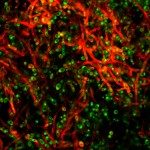Institut Pasteur is looking for an Early Stage Researcher (ESR) with a focus on studying the influence of the microbiota on gastrointestinal colonization by the fungal pathogenof humans, Candida albicans, in healthy individuals. Fungal infections are an increasing concern in developed countries, especially in the hospital setting where they have become one of the first causes of nosocomial infections. A majority of life-threatening systemic fungal infections are caused by species of the genus Candida, among which C. albicans is the most frequent.
The PhD student will be based in the Fungal Biology and Pathogenicity Unit at Institut Pasteur, led by Prof. Christophe d’Enfert, and will be supervised by Dr. Marie-Elisabeth Bougnoux. The main aims of the Fungal Biology and Pathogenicity Unit are to study the biology of C. albicans, the pathophysiology of infections due to this opportunistic pathogen and their epidemiology, with a view to providing solutions for the management of fungal infections. The Fungal Biology and Pathogencity Unit studies C. albicans genomic diversity, its phenotypic consequences and its underlying mechanisms. A second aim of the Unit is to understand the molecular mechanisms that underlie the colonization of abiotic and biotic surfaces by C. albicans. Research on these themes relies on functional genomics tools, some of which are developed within the Unit.
The current project is in the framework of FunHoMic: “Deciphering the fungus-host-microbiota interplay to improve the management of fungal infections”, a Marie Skłodowska-Curie Innovative Training Network which started on the 1st of January 2019 (See more details at www.funhomic.eu).
About the ESR project:
The PhD student will explore the influence of the microbiota on C. albicans colonization in the gastro-intestinal tract. First, the successful applicant will assess the extent of C. albicans gastrointestinal colonization in 1000 healthy individuals of the Milieu Intérieur cohort by using qPCR on DNA from fecal samples. Second he/she will characterize the mycobiota of these individuals (grouped according to sex, age) with low or high level of C. albicans colonization and subsequently search for significant correlation between the extent of Candida gastrointestinal colonization and the immune and microbiota status. Finally, the PhD student will select, based on these correlations, bacterial and fungal species and evaluate them for anti-Candida activity in C. albicans ex vivo and in vivo gastrointestinal colonization models.
During the project the candidate will be seconded as follows: 3 months at Val d’Hebron research Institute, Barcelona, Spain to analyze metagenomics data, and 3 months at ProDigest, Gent, Belgium to investigate the impact of selected bacteria on C. albicans expansion in the microbiota.
The successful applicant will also benefit from the training program implemented by FunHoMic that includes summer schools and webinars.
Candidate’s profile: We expect a Master´s degree (or equivalent) in Life Sciences (e.g. Biology, Biochemistry, Microbiology or Immunology). Furthermore, the applicant should be able to perform team-oriented as well as independent work. Practical experiences in one or more of the following subjects are beneficial: Microbiology, Molecular Biology, Metagenomics. Practical experience in statistics is an advantage. A good level of English is required. Basic level of French would be appreciated.
Eligibility: Applicants can be of any nationality and must be Early-Stage Researchers in the first four years of their research career and must not have been awarded a PhD. They must not have resided or carried out their main activity (work, studies, etc.) in France for more than 12 months in the 3 years immediately prior to their recruitment.
Starting date: 1st July – 1st October 2019
Duration: 36 months
Salary: According to the Marie Curie-ITN rules
How to apply:
Applications should be sent to Marie-Elisabeth Bougnoux bougnoux@pasteur.fr
The application will only be considered if it includes the following:
– Letter of motivation
– Curriculum vitae of at most 3 pages
– A complete list of publications
– Copies of University Diploma or Master certificates
– A statement of research experiences of at most 2 pages
– Contact details of two possible referees
Deadline for application: 31st March 2019

